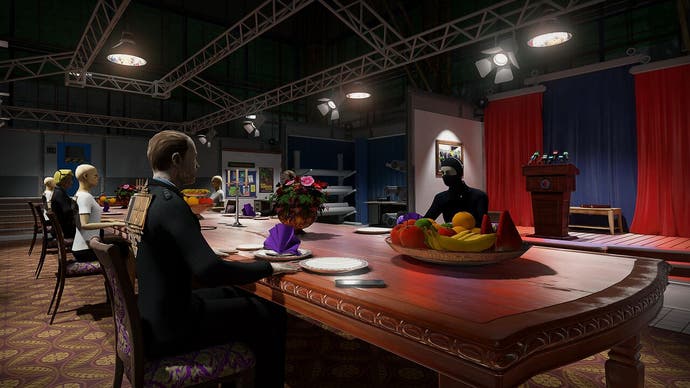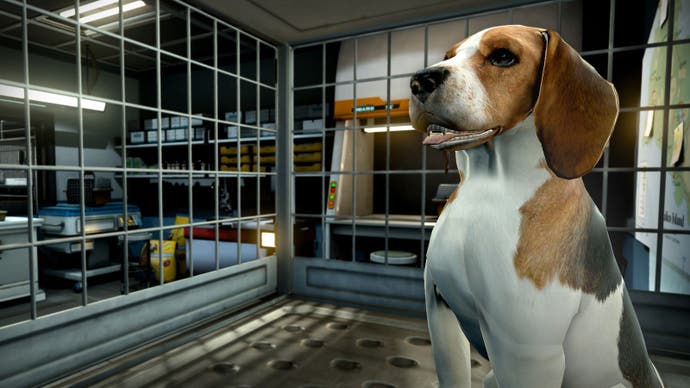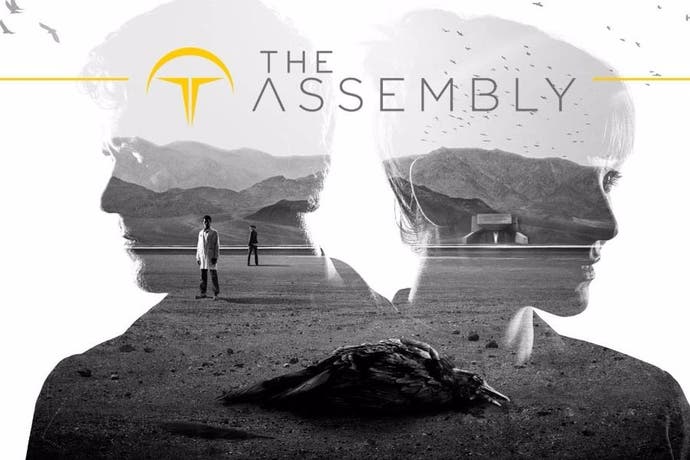The Assembly review
Assemble with care.
One of the pleasures of VR is seeing old genres reinvented or reinvigorated by an all-new perspective. The Assembly, nDream's sci-fi moral adventure created bespoke for virtual reality, is a case in point - it's a slow-paced, combat free exploration adventure told from the perspectives of two different characters, enhanced by the simple and essential act of looking.
The vast underground research facility you're exploring is familiar enough - you'll have walked corridors like these countless times before, piecing together the little human stories that are found in the detritus on abandoned desktops while a bigger, more sinister picture slowly emerges. But you won't have inhabited them quite so fully: leaning into someone's office drawers to pick out an important file; picking through post-it notes or whiteboard scrawlings; investigating the stains inside a well-loved coffee cup.
It's a neat underlining of the fact these games have always had an unhealthy dose of voyeurism at their heart; whether it's Gone Home or BioShock, there's the slight unease of picking through other people's lives that's given an added frisson through the wonder of VR. You're still a passive spectator in The Assembly, but with a headset on you're implicated in the world to an uncomfortable, often exhilarating degree.

The world itself - a cold warren of research labs and impossibly large test chambers with a brief detour to some more welcoming living quarters - feels a little hokey, but it's delivered at an agreeable lick. Across 12 short chapters you flick between Cal Pearson, a scientist embedded in The Assembly who's slowly exposing how far his colleagues have gone in order to serve the greater good, and Madeleine Stone, a disgraced doctor signed up to the organisation against her will. Between Cal's droll mid-western drawl and the plummy home counties pep of Madeleine there's something of an afternoon Radio 4 play, and in the murky moral tale at the heart of the facility there's some dim reflection of British sci-fi classics such as Quatermass.
The moral choices you're presented with towards the game's climax are too blunt and too crude to be truly effective - there's even a puppy to be sacrificed, should you so choose - and by the end any grand message feels obscured by awkward moral posturing. The Assembly does a good job of getting you to that climax, though. The two different perspectives keep things motoring along, while offering a gentle shift in tone: as Cal you're spending your time exploring the facility, while as Madeleine you're engaged in puzzles set out by The Assembly, some of which have you shifting blocks while others engage you in light detective work.
It's all a bit too light, however, and there's a sense of uneasy compromise throughout The Assembly. Some of its shortcuts are cute - a b-movie vibe is enhanced by the characters you encounter having their mouths covered up by fabric in the none-too-flattering outfit of The Assembly, no doubt to sidestep the complicated business of facial animation - but elsewhere there's the sense nDreams hasn't quite fully exploited the potential of VR.

It's certainly understood some of the pitfalls - moving around is done by 'blinking' from place to place, positioning a cursor before teleporting across, sidestepping the motion sickness that comes through free movement in VR using a gamepad or mouse. Take off the headset, though - and it's possible to play The Assembly with a traditional 2D flatscreen - and you've an adventure that's grossly unremarkable.
Despite its knowing nods and gentle digs - Cal openly wonders at one point why so many computers are left unlocked - this is still a game that's spent mostly rifling through other people's email accounts, sifting through neatly observed strands of office life in order to procure a passcode that'll get you into an locked laboratory door where you can do it all over again. That so much of The Assembly, a game designed for VR, has you staring at the flat monitor of stranger's computers, feels like an uncomfortable irony.
Which isn't to say what nDreams has achieved here is without interest. It's a breezy adventure with some enjoyably chewy sci-fi at its heart, emboldened by its use of VR as an immersive window on another world. That new perspective isn't enough to hide mundane underpinnings, or to excuse how tired its mechanics can feel. For all its questioning of how far the scientists of its institution will go in their pursuits, there's the nagging feeling that with The Assembly nDreams hasn't gone quite far enough.

